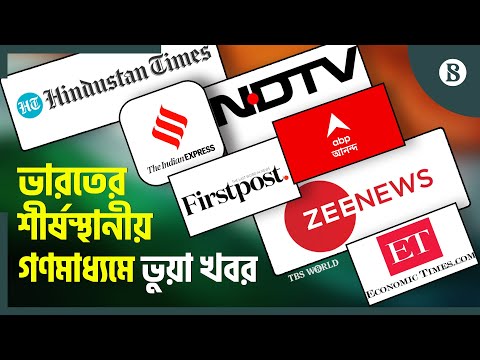POBNEWS24, Desk report Dhaka Dec 27, 2024 : In 2001, soon after BNP came to power, journalist Shahriar Kabir, one of the policy makers of the Ghatak Dalal Nirmul Committee of Bangladesh, felt the need to form an organization in Kolkata like the Hindu Buddhist Christian Unity Council. Later, it was formed and named Campaign Against Atrocities On Minorities in Bangladesh (CAAMB). The objective was to oppress minorities (Muslims) in India. As a result, Muslims in India would plead with Muslims in Bangladesh not to so-called oppress Hindus living in Bangladesh. As a result of this policy making, that organization emerged. And the Hindu Buddhist Christian Unity Council was formed in Bangladesh in 1988. Its presidents were three people. Major General C. R. Dutta, Bodhi Pal Mahathero and T. Rosario. General Secretary Nim Chandra Bhowmik. Apart from this, the committee members who were there at that time are still there, there has been no change. The committee also includes Kajal Debnath, Manindra Nath, journalist Subhash Chandra Badal, etc. Senior journalist from Kolkata, Saad Uddin, has sent a report on this in his own words. The report is presented in full for the readers.
He wrote, the myths of minority oppression in Bangladesh in West Bengal, India, began in 2002-2003. BNP was in power in Bangladesh at that time. At that time, the Campaign Against Atrocities On Minorities in Bangladesh (CAAMB) was formed at the Mahabodhi Society Hall in College Street, Kolkata. Shahriar Kabir, a journalist from the Nirmul Committee, a killer broker of Bangladesh, was present when this CAAMB was formed. I certainly find minority oppression in any country to be abhorrent. But when madness is created by spreading myths, it becomes more dangerous. I think that in the country where minority oppression occurs, it should be tried according to the laws of that country. Not only that, I think that the fight and movement should be intense in that country. CAMB organized a big event on this at Ballygunge Education Center in South Kolkata on January 22-23, 2004. Members of the Bangladesh Hindu-Buddhist-Christian Unity Council came to that event. Bimal Pramanik, Mohit Roy, Achinta Gupta and others were present from CAMB. Former Vice Chancellor of Calcutta University, late Santosh Bhattacharya, Shivnarayan Roy and many others came here. These two people uttered a great truth at that time. They said, ‘When we talk about the oppression of minorities over there (Bangladesh), why do we forget the oppression of minorities over here? Why don’t we have Gujarat, Nellie, Bhagalpur, Surat and Mumbai here too’. Controversial Bangladeshi writer Taslim Nasreen was present at that meeting. She recited a protest poem on the oppression of minorities in Gujarat and Bangladesh that day. But the situation was heated by another controversial Bangladeshi writer Salam Azad (currently staying in Delhi under the hospitality of the Indian intelligence agency ‘RAW’). He said, “To save the minorities of Bangladesh, we have to hand over weapons to the majority (Hindus) here and beat up the minorities (Muslims) here. Then these minorities will tell the majority of Bangladesh, you save your minorities, otherwise we cannot survive. There is no other way.” But the matter immediately came to the notice of the Kolkata Police. Then a strict crackdown was imposed on the matter. Although there were conferences on this issue once or twice at Ballygunge Education Center or Jadavpur University, nothing like that happened in Kolkata. But CAMB spread this false story even more by displaying fake CDs in the border districts. It gained quite some influence. This kind of statement by writer Salam Azad at Ballygunge Education Center heated up the situation that day. The police started to fear that there was a park circus next door. A large police force was deployed fearing communal tension. As part of that continuity, this time, Shuvendu Adhikari’s project. Through that project, he (Shubhendu Adhikari) flopped the Navanna campaign in the G-Car incident. So, ahead of the 2026 West Bengal Assembly elections, Shuvendubabu and others are trying to polarize votes by creating religious hysteria. More fake news has been spread than what happened in Bangladesh. It has been seen that at least 50 TV channels here (in West Bengal) have given fake news by showing pictures of minority persecution in India’s Hathras. And there is an attempt to make Chinmoy Das, the anti-social figure expelled from ISKCON, a hero. But the murder of Chittagong lawyer Saiful Islam was completely bypassed. I asked at least half a century of Hindu friends in Chittagong or Bangladesh to know the truth of the incident.
They said, the situation is getting worse with about 50 private TV channels in India. We are also very uncomfortable here because of this. It is true that Shuvendubabu is a super flop. The result of many efforts by Sayan Haldar, Kartik Maharaj or Bharatnath Jhawar of Beldanga. This is the reality. After the Beldanga incident became normal, what happened at the Berhampur District Book Fair in Murshidabad on December 15 (2024)? A major communal riot was prevented that day due to the efforts of the police or the role of the common people. But CAMB in West Bengal is still continuing its work with false stories.
Before the incident that happened in the Kartik fight in Beldanga, a major incident took place at Jhaubona High School near Trimohini of Nawada police station surrounding Saraswati Puja. Three Muslim youths were killed. The gurus of those plays were also at the root of it. A section of the media praised them. A section of the media representatives, while showing sympathy for Muslims in the area, actually provided secret reports to the BJP-RSS, which is a dangerous trend. Our media does not know that the elite Muslims of the area donated the land for Sahargachi Ramakrishna Mission and Beldanga Bharat Seva Ashram. Our media (West Bengal) does not talk about those who played an important role in normalizing the situation in that area. Those who played a role at that time were Dr. Asaduzzaman, former principal of Beldanga College Sanat Kar and Arup Chakraborty. Even today, the common people of those areas (West Bengal) pay them thousands of compliments and respect.







